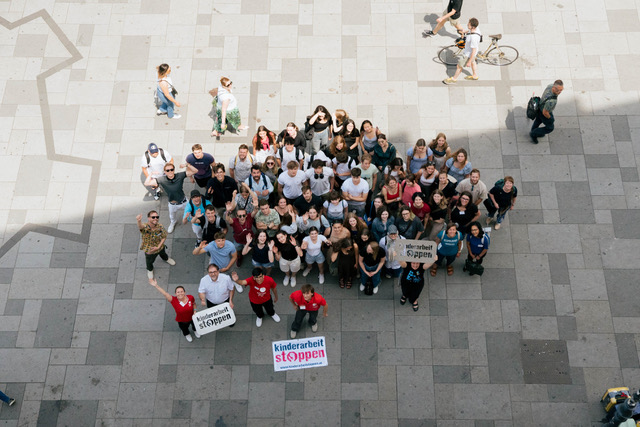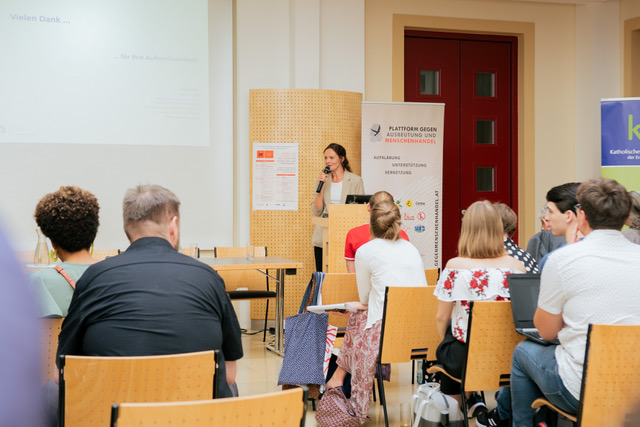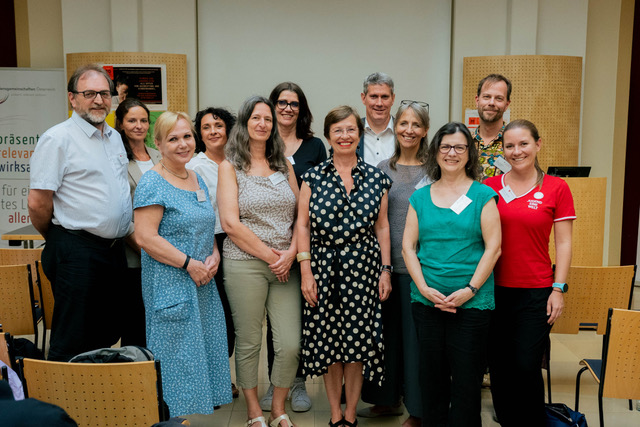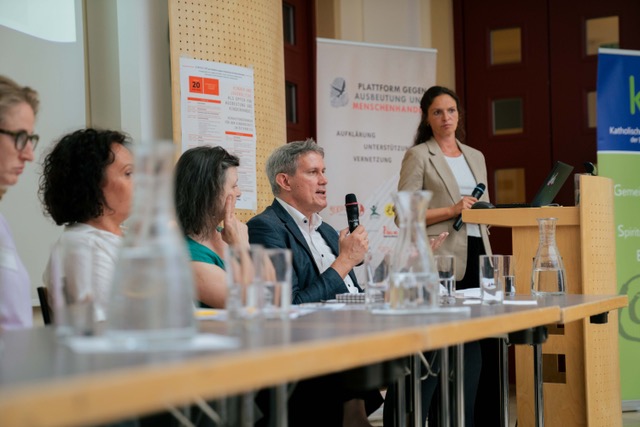The Symposium of the Platform Against Exploitation and Human Trafficking was held on 20 June 2023. A range of school pupils, young adults, politicians, representatives of the media, children’s and youth organisations and the social sector met at the Curhaus at Stephansplatz in Vienna to discuss key questions and exchange views on the issue of “Children and Young People as Victims of Exploitation and Child Trafficking”, and to bring all involved up-to-date with the latest situation.
CHILD LABOUR IS (STILL) OMNIPRESENT

The Symposium consisted of a series of talks, which was opened by Reinhard Heiserer. Heiserer’s journey as a development aid worker began in South America, after which he founded the association “Jugend Eine Welt”, together with volunteers and friends of Don Bosco. Today, this is one of the most important aid organisations in Austria, and continually developing further. Today, Heiserer is the director of the organisation, and in a position to pass on a great deal of his hugely important experience. As part of the talk, he explained vividly that child labour remains omnipresent in the products and goods we buy, from coffee to chocolate, clothing and other goods. The fact that such work is going on in locations far away from “us” nowadays doesn’t mean it simply doesn’t exist, however.
Historically speaking, children were also working in Austria until relatively recently. Perhaps the best-remembered of these were the Schwabenkinder (“Swabian children”). Until around a century ago, these children would regularly travel to the region of Upper Swabia due to the poverty of their families, where they would serve as seasonal workers for local farmers. Heiserer provided an array of current and historical examples of child labour, including children working as chimney sweeps in Vienna during Austria’s early years of industrialisation, as helpers in fireworks production in India today, or in tobacco cultivation, particularly in Malawi.
The tobacco industry alone employs around 70,000 children to this day. Finishing off his talk, Heiserer pointed out that greater attention needed to be paid to the problem of exploitation as a whole if the situation were to be expected to change. Disseminating information on the issue is helpful, but altering our personal purchasing behaviour can also have positive effects – less is more, and at FairTrade, you can (usually) be sure workers are working under fair conditions, due to comprehensive checks. Other meaningful measures would include better supply chain laws and the funding of monastery schools where the state fails in its duty to care for the well-being of children. Heiserer concluded his talk by praising Don Bosco, who said one should do everything possible, up to the limit of audacity. An appeal to all of us not to merely be comfortable, or look away from injustice.
CHILD TRAFFICKING AND REFUGEE ORPHANS
The meeting moved on with talks by Astrid Winkler (ECPAT) and Lisa Wolfsegger from Asylum Coordination. Winkler highlighted a number of examples of child trafficking – including incidents in Vienna in which children from Eastern Europe are deliberately being trained to be pickpockets. In many cases, these children are attracted by false promises and incentive offers, only to be drawn into a world of terror and exploitation. Identifying victims of human trafficking becomes even more difficult in the case of children than with adults. One shocking example of this is the case of Amina, dating back to 2016. She disappeared without trace from Traiskirchen refugee camp, and despite the fact that there were signs of human trafficking, the explanation for her disappearance became highly complex.

Another tragic example is that of Sascha, who was driven by the dream of becoming a model. He discovered an enticing ad in a local newspaper which promised him a chance in the fashion industry. Naive and full of hope, he went to the people who had placed the ad, and appeared to have got the job with an agency. Sascha’s parents knew nothing of all this, however, and he set out on an apparently exciting journey through the USA, with no idea of what actually awaited him. At the end of his trip, however, he was taken into a loft and forced to let himself be filmed for pornographic content.
Lisa Wolfsegger spoke primarily about refugee orphans. Children who have sought refuge without their parents often undertake dangerous journeys via Turkey, Bulgaria and the Balkans in an effort to reach Central Europe. Last year, 13,276 refugee orphans have submitted asylum applications in Austria, and this year alone, 31% of applications have already been made by children. The main countries of origin of these children are Afghanistan, Syria, Somalia, Nigeria and Iraq, as well as others where war, conflict and crises dominate. As soon as the children are in Austria, they make an application for protection with the police, like adults. This is followed by an initial questioning, when the reasons for their seeking refuge are established. After this, they receive a “green card”, and a check is carried out into whether Austria is responsible for their asylum application. Unlike with adults, the Dublin procedure is not applied to refugee orphans. The challenges begin with the medical examination done to establish the exact age of the children. This is often not conclusive, as many children have lost their papers while seeking refuge or are using forged papers. As nobody has the right of parental custody for them, it often takes a very long time for the transfer of custody to take place before a court. Organisations such as Asylum Coordination are of huge importance at this point. The children spend long periods of time in federal care centres such as Traiskirchen, where the length of stay is often over 100 days. During this time, many disappear without trace. Despite the fact that there are over 11,000 known cases in which refugee orphans have disappeared, hardly any track is kept of them. Traiskirchen is not a prison facility; children are allowed to leave the premises. To improve the situation, high-quality care for these children is urgently necessary. NGOs like Don Bosco operate around 30 institutions in Austria offering support and protection for refugee orphans. Regrettably, however, rumours continue to circulate that Austria is not taking any more Afghans, even though it is in fact possible for anyone from Afghanistan to apply for asylum and seek protection. The challenges of dealing with refugee orphans are wide and diverse, and demand a comprehensive and dedicated approach. Effective care, taking individual needs into consideration and cooperation between state authorities and NGOs are crucial in offering these vulnerable children a safe future.
OUTREACH SOCIAL WORK, CHILDREN’S RIGHTS AND VICTIM PROTECTION

Next to speak was Sabine Kallauch, who spoke about her work at Kavod. Outreach social work in the red light district such as that done by her and many helpers offers prostitutes a way of escaping the sex industry. Kallauch is currently spending much of her time travelling to Ukraine. One absurdity is the following fact: asylum seekers can work on a self-employed basis immediately after registering with the police, but not as employees. Only a small percentage work voluntarily in prostitution, with poverty one of the main reasons people often have no choice but to take this path.
The legal situation regarding prostitution varies in Europe. While the laws in Eastern Europe are relatively vague on the issue, prostitution is extensively legalised in Western Europe, while in Northern Europe there is a ban on buying sex in place (the “Nordic Model”), under which the “buyer” is punished. Finally, Kallauch mentioned the “loverboy method”. Often better-known to the public at large, this is when, rather than experiencing true love, women’s love become little more than “goods”. Pimps exploit; loverboys steal souls.
Next to speak was Sarah Zauner from the Federal Youth Representation. She talked about the UN Convention on Children’s Rights – countries which are signatories to this are obligated to meet and strengthen the rights of children. Austria became a signatory in 1992. Amongst other things, children have the right to an achievable maximum degree of health, a reasonable standing of living, education (to enable equality of opportunity), the right to peace, free time and play, and protection from economic exploitation. Above and beyond this, children’s rights are anchored in the Austria’s Federal Constitution. Another right Zauner referred to was the right to participation – the Federal Youth Representation makes a particularly intense effort to provide this right; she recently made possible the “Youth Climate Council”, for example.
TOWARDS A BETTER FUTURE
Towards the end of the meeting, things became more philosophical, as Katharina Beclin presented the results of the World Café Discussion, at which questions which cannot be clearly answered and stimulate thought were considered. One example is the question of “self-exploitation”: When do we condemn a situation as this, particularly if the person affected doesn’t feel they are being exploited, or is being exploited but has no problem with it? Something similar apples to the issue of forced marriage, when the limits are fluid and it would be wrong to judge people en masse for their behaviour simply because one believes they have let themselves be exploited voluntarily. It is better to talk to them and find out how it relates to their feelings, what moves them to behave in such a way, and use other approaches.

There was also a representative of the sciences present on stage, in the shape of Helmut Sax of the Ludwig-Boltzmann-Institut. An expert in human rights, Sax pointed out that the subject of human trafficking and exploitation is a richly-faceted and complex one, the reasons for which often lie in power imbalances and the interests of profit. Fighting against this requires consciousness-building and the dissemination of information.
Martina Wolf introduced the work of “child protection centres”. These are advice centres, and not initial reception camps, as is sometimes believed. Child protection centres also work together with violent parents, while psychotherapy and advice services are also offered. Wolf’s talk was the last of the day, concluding with a podium discussion in which the issue was looked at in general and discussed once again – including how a better future free of exploitation and power imbalances might look. Hope for the Future was there, and will continue to work to achieve this.
Translated by Tim Lywood
#Menschenhandel #Kinderhandel #Zwangsarbeit #Kinderarbeit #Kapitalismus #Freiheit #Europa #Kriminalität #Fluchtwaisen #Rotlicht #Pornographie #AgainstHumanTrafficking #GegenMenschenhandel #EndExploitation #EndTrafficking #HopeForTheFuture #Österreich
